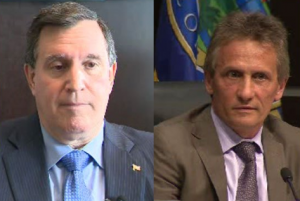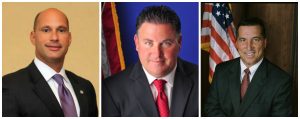The political bomb that exploded in Doral last week has had its aftershocks.
Already, there is an investigation into the campaign office rental of Mayor Luigi Boria and another inquiry on his links with a friend and property owner who bought the property from Boria’s children with money the mayor may have lent him and who wants to build in the city.

There was also the resignation Monday of his assistant, who suddenly felt uncomfortable with his position.
But Doral — which has ties to two other municipal mayors who were arrested two months ago as well as one of the lobbyists involved in a federal kickback scheme — is not alone in its constant state of alert, where everyone is wondering what’s next and waiting for the next domino to fall.
The cities of Sweetwater and Miami Lakes have also reaped a rapid-fire series of scandals that only just started with the arrests in August of both mayors on federal bribery and extortion charges.
Former Sweetwater Mayor Manny “Maraña” Maroño, who is reportedly cooperating with authorities – and handing up bigger fish, sources say — is involved in new (everything old is new again) allegations about his one-time towing company, Southland Towing, which many believe he is still a silent partner in.
At one point, the towing company had at least part of the city’s business – and the highest towing fee in the county.
In Miami Lakes, where former Mayor Michael “Muscles” Pizzi is not cooperating with the authorities and continues to insist on his innocence, federal agents are pouring through his colorful past, which includes wiretape of Pizzi asking a confidante to get rid of a rival councilman – and offering $100,000 to get it done, whether he had to “rig his f—— brakes,” or plant cocaine in his car.
Investigators are also are talking to witnesses in several other cases in the past – including one where someone allegedly stole $200,000 from his office and another in which a fire was intentionally set in the very same office just weeks later. They are looking at the ties with and favors to a developer who may have helped Pizzi get his gig as city attorney in the Town of Medley.
There are so many public corruption cases going at the same time that it leads us to question… Is there something in the water? Something that makes Miami-Dade the nation’s capital of graft?
Wilfredo Ferrer, U.S. Attorney for the Southern District, said that his office prosecutes more public corruption cases than any in the country. In fact, cases involving elected officials or government employees have gone up 40 percent since he was appointed by President Barack Obama in 2010.
University of Miami Professor Anthony “Tony” Alfieri, director of the law school’s Center of Ethics and Public Service, says there are two ingredients that are central to the spate of scandals: a lack of values and the proliferation of governments, which creates a plethora of possibilities.
“Even in 2013, the culture of government accountability, the culture of government compliance and the values of candor and transparency, those are still not well developed in South Florida,” Alfieri said. “Simply as a historical matter, we don’t have those commitments in the community.”
The second factor makes much of public corruption crimes of opportunity. The three cities in today’s headlines are some of Miami-Dade’s smaller towns. Miami Lakes and Doral are newer municipalities that were incorporated by its residents; Doral as recently as 10 years ago. That may make them more inherent to political pitfalls.
“When you decentralize government and you build these new government entities, municipalities or towns or whatever the structure is, these entities don’t have even the limited benefit of building on good government policies that might be available at the county or state or federal levels,” Alfieri said.
“These new governments suffer because they are essentially acting in isolation,” he said. “Governments are proliferating and that creates a higher risk of misconduct or non-compliance.”
Doral’s founding mayor, Juan Carlos Bermudez, fought for almost 10 years to incorporate the city and says that it is unfortunate that the headlines about secret land deals and possible conflicts of interest are taking away from the all the good the cityhas done, principally creating parks and fixing streets.
“Obviously, the intent was not to have these kinds of issues,” said Bermudez, who still believes that there needs to be a conversation about regionalizing county government and incorporating cities.
“I’m afraid people are throwing away the baby with the bathwater,” Bermudez said.
“There’s no question that the recent scandals have raised the argument that if there is more government, there is more opportunity for corruption. Mathematically, that is true,” he said.
Bermudez points to a multitude of scandals at the county level.
“If you’re not going to follow the rules as a city or town official, you are not going to follow the rules as a county or state official either,” Bermudez said.
But Alfieri says that newer cities not only lack a continuity of government, they lack the infrastructure to address issues related to corruption and ethics.
“They can adopt or borrow rules from other municipalities, but it’s hard to borrow a culture, it’s hard to borrow an environment,” Alfieri added. “That requires education, training, experience.”
Former Miami-Dade Commissioner Katy Sorenson is trying to provide some of that education and training through the Good Government Initiative, which she founded in 2010 after she retired from office to educate elected officials at the state and local level, to make them not only more competent, but more ethical.

The program has had 36 local and state officials graduate – and Sorenson breathes a sigh of relief because the list does not include the three mayors who were arrested earlier this year: Maroño, Pizzi and Homestead’s Steve Bateman, who was arrested for having a secret lobbying job where he used his position to help a company with development approvals at the city and county level.
“Thank goodness they are not,” Sorenson said, adding that it might just be a matter of time before someone in the headlines is. That is one of the reasons why the program screens applicants very thoroughly and asks them if they have ever been suspended from office. One woman answered no on the application, but a quick Google search found that she had been. She was not accepted.
And while prosecutors said at a recent Good Government Initiative panel discussion said it can’t be stopped, the Google anecdote illustrates one thing that may help curb public corruption: Public scrutiny, which is becoming easier and more, well, public with the increasing use of social media.
“The community is beginning to be more outraged as more light is shone on things that are happening,” said Sorenson, citing blogs (she’s a fan of Political Cortadito!) and public online forums as new mediums that may help keep elected officials honest.
“When social media is reacting, these things are exposed to a lot more people,” she said. “I think it’s a great thing and we’ll probably see a real decline is this type of activity as people realize that they can’t get away with it the way they used to.”
Both she and Alfieri agree, however, that law enforcement plays a big role and that as more cases are investigated and prosecuted, the opportunities for graft will look less and less appealing.
“Seeing an elected official in handcuffs is going to make some people rethink anything they might have not given second thought to before,” Sorenson said, calling it “positive peer pressure.”
Said Alfieri: “A change in culture requires not only a civil-minded community, but it also requires he help of ethics commissions and local and state law enforcement, the oversight of the state attorney’s office, the Attorney General and the U.S. attorney.”
“For government to really get cleaned up,” Alfieri added, “that needs to happen on a daily basis.”
And in Miami-Dade these days, it seems that it is.


